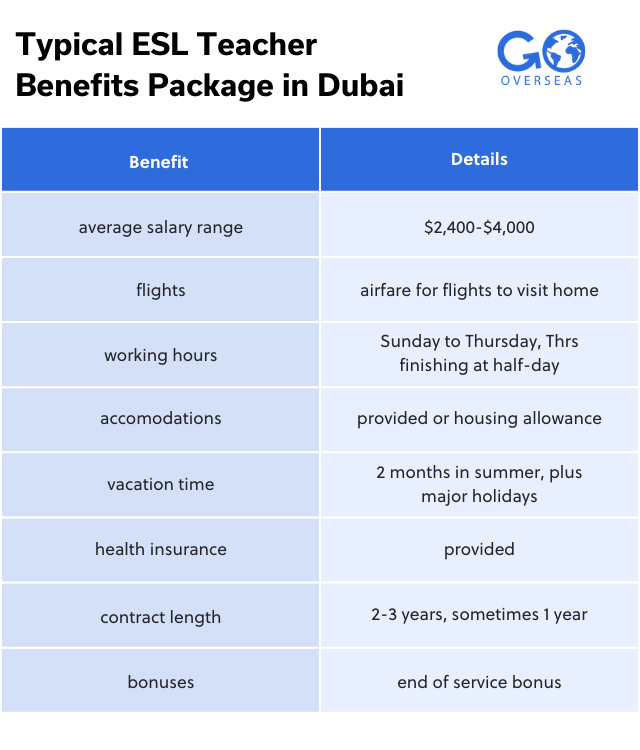
How to Get a Job Teaching English in Dubai
Looking for teaching jobs in Dubai? You're in the right place! Read on for helpful tips for landing a job teaching English in Dubai and gain insight on living there.

Dubai, United Arab Emirates (UAE), is a rapidly growing city, and with its economic growth, an influx of expats have come. As a result, teaching English as a foreign language (TEFL) in Dubai has become a viable option for both experienced and new teachers who want to teach abroad.
If you’re considering an opportunity to teach English in Dubai, read on for more information about obtaining TEFL certification, landing teaching jobs in Dubai, and insight on living there!
Why teach English in Dubai?
Teaching in Dubai can be an excellent opportunity for you to experience a vibrant city and culture while earning a salary that would make it possible to have a very high standard of living. You can take advantage of the city’s many amenities, from fine dining to world-class shopping.
Is it worth it to teach in Dubai?
The answer is yes! The UAE is a fascinating place to live and work as a teacher. Over the last two decades, the country’s rapid development has caused a great need for qualified educators. Teachers can enjoy high salaries, tax-free income, and several other benefits such as subsidized accommodation, flights home, and medical cover.
There are also many things to do in Dubai to enhance your experience while living there. You can spend your weekends at one of the many famous shopping malls, skiing on the indoor slopes, or visiting incredible building projects like Palm Island, Burj Khalifa (the world's tallest building), the Burj Al Arab hotel, and so much more. Not to mention Dubai is known as a travel hub with nearby countries like India or Egypt to visit during your vacation time!
Major benefits of teaching in Dubai
- Competitive salary and lifestyle. The average U.S. teacher makes $61,000 per year, but that number can increase if you teach in other countries like the United Arab Emirates (UAE).
- Tax-free salary. Not only will you receive a competitive salary as an ESL teacher in Dubai or another part of the Middle East—you’ll also get to keep your entire paycheck without being taxed on it!
- Career advancement opportunities. Dubai’s education system is changing at a rapid pace, and there are many opportunities for professional development for teachers who wish to progress their career by becoming an educator, trainer or curriculum developer within the UAE’s growing market.
- Working with a diverse community of students and teachers. Teaching in Dubai allows you to work alongside colleagues from roughly 200 nationalities while gaining exposure to different cultures and lifestyles through interactions with your students' parents, who often come from across Asia or Africa.
- Learning about a new culture. Teaching in Dubai, you’re surrounded by a culture that is influenced by many different countries. The main cultural points specific to the UAE you’ll learn while living here are about the Islamic faith, Arabic language and literature, the history of Dubai, and Emirati culture.
- Travel and sunshine. You'll be able to enjoy your days out at the beach or exploring the city as much as you like.
How much money can an English teacher make in Dubai?

As one of the 10 best places to teach abroad in 2022, the UAE is listed as the best for high salaries. However, your salary will depend on the school and your qualifications and experience.
Wages in Dubai are generally higher than in most other countries. As a teacher, you can earn anywhere from $2,400 USD per month to $4,000 USD. Salaries go up with qualifications; for example, teachers with a master’s degree will receive higher pay than those with just a bachelor's. Likewise, people with more teaching experience will also see their salaries increase annually.

What are the requirements to be an ESL teacher in Dubai?
To qualify for a public sector teaching job in Dubai, you’ll need to meet the following requirements:
A bachelor’s degree
To be qualified to teach in Dubai, you must have a bachelor’s degree from an accredited institution (in any subject). Some positions require master’s degrees and previous experience in education, but generally, this isn’t necessary - especially if you have other valuable skills and experiences to offer as an educator!
A TEFL/TESOL certificate
A TEFL/TESOL certificate from a recognized course provider is strongly preferred by many employers. It will increase your chances of getting hired quickly. In addition, most online courses are internationally recognized. However, it’s best to choose one accredited by an international governing body such as the International TEFL Academy. Those with a 100-hour TEFL certification (or higher) will receive preference over those with shorter TEFL certificates.
Experience
The amount of experience required depends on your level of education and which school you are applying to teach. Some schools require two years of experience from teachers with bachelor’s degrees, while others require three or more. Check the requirements of the specific school you are interested in teaching before applying.
Types of English teaching jobs in Dubai

There are three types of teaching jobs in Dubai: public schools, private schools, and international schools. Public schools in the UAE run on a Ministry-approved curriculum and are funded by the government. Private schools adhere to the Ministry-approved curriculum but are independently funded. International schools follow different curriculums (British, American, or International Baccalaureate).
As a teacher in either a public or private school, you'll be teaching according to the Ministry-approved UAE curriculum; however, you can expect more flexibility at private institutions. If you work at one of these institutions, you may get to teach subjects outside your specialism, provided that you meet age requirements for specific topics. On the other hand, teachers working in international schools follow their curricula (British National Curriculum/National Curriculum of England/IB). This means teachers usually teach within their specialism as exam boards require subject expertise in each field.
Teacher’s assistant option
As a teaching assistant, you will work in the classroom, supporting students and teachers. You can also prepare lessons under the supervision of your teacher. Even if you do not have any formal experience in education as a teaching assistant, you can still get this job in Dubai schools. However, most companies are looking to hire people with some experience or qualification directly related to the position they are applying for.
You can earn a good salary as an assistant teacher in Dubai, but it depends on your educational qualifications and experience. If you do not have enough experience, getting a job as an assistant teacher will be a great way to qualify for higher-paying roles in the future.
Read more: 10 Insider Tips for Teaching ESL in the Middle East
What to look for in a school

Before applying to a teaching position at any school in Dubai, you need to do your research on it. Here are some things to know and look for:
- Schools must be approved by the KHDA—the Knowledge and Human Development Authority.
- Look for schools that are accredited by the Council of International Schools (CIS), the Middle States Association of Colleges and Schools (MSA), or the New England Association of Schools and Colleges (NEASC).
- Check out the school's website. This will give you a clear picture of what they're about, their values, how big they are, etc. If possible, take a virtual tour to get more familiar with their campuses.
- Search for reviews from other teachers on places like Glassdoor, Indeed, or Schools Compared. This can offer an inside look into what it would be like to work at that school from people who have been there before you.
How to apply for an English teaching job in Dubai

Teaching jobs in Dubai are as diverse as the city itself, and you need to choose one that fits your qualifications and experience. Whether it will be at an international school or a university - or even a private institution for business English - there are plenty of opportunities for you across this city. Start with the schools themselves if you have no idea where to begin. Look up websites, identify their mission and culture – and see if they appeal to you. Then figure out what subjects they teach, where they are located in the city, and whether they offer any additional perks such as travel allowances or accommodation (which they might).
Apply directly to the school
Some schools advertise openings for teachers on their websites, and you can apply directly by submitting your resume and cover letter to them.
Use a job search site
You can also search online job portals such as Tes, Indeed, or LinkedIn and approach individual schools directly. Bayt is one of the largest job-search sites in the Middle East, and there are many English teaching jobs advertised on it, including positions in Dubai. You can also check out other similar sites like Monster Gulf or Indeed.
But our recommendation is first to check out the programs we have listed here on Go Overseas!
Several teaching programs in Dubai offer certification and financial support for teaching Dubai. These programs are a great way to get your foot in the door and start your teaching career in Dubai.
Here are a few great teaching programs to check out:
Get a job through a teacher recruitment agency
The best way to look for a teaching job in Dubai is by using a recruitment agency. They are in contact with schools daily and will help you through the application process and advise you on how to prepare for interviews.
Recruitment specialists work with a range of schools and match you with a school that best suits you. Many agencies specialize in recruiting teachers for jobs worldwide, including in Dubai. While some will require that you have at least two years of experience teaching before they'll consider you, others will hire recent college graduates – you should find this information on their websites.
Attend a recruitment fair
One of the most common ways to find a teaching job in Dubai is to attend one of the many recruitment fairs worldwide each year. Recruitment fairs are usually organized by independent companies and sponsored by UAE schools, inviting teachers to interview them face-to-face before offering them positions.
Job search assistance through TEFL courses
Another way to find work is via TEFL training organizations, many of which have partnerships with local schools and employers who take on their trainees after completing their courses. If you want to apply for a teaching job in Dubai without help from an intermediary, submit your resume and covering letter directly to the school's human resources department. To increase your chances of getting called for an interview, make sure that both documents are tailored specifically for the school you're applying to so that it's clear why you're interested in working there, what relevant experience you have, and what skills you could bring if hired.
Try to get a personal recommendation
If you know someone who lives or has lived in Dubai, ask them if there are any schools where they would recommend working at (or not working at). The more recommendations from people whose opinions you trust, the better!
Read more: How to Create an ESL Teacher Resume that Will Get You the Job
Interview process & contracts

The interview process for teachers in Dubai is similar to the process in other locations around the globe. After submitting your application online, you'll likely be contacted via email to set up a phone interview. This call will be focused on your experience, what you have to offer as a teacher, and why you're interested in teaching abroad. It's just an initial conversation with the recruiter to ensure that you have a chance of getting hired somewhere.
After that call, they may ask you to submit additional paperwork (such as letters of recommendation or proof of your qualifications). If all goes well at this point, they'll invite you for an in-person interview. This can occur either here in the U.S. or when you arrive for orientation in Dubai. This will be your final chance to impress potential employers before being offered a contract.
Types of teaching contracts in the UAE
There are two types of teaching contracts in the UAE that you should know about: limited term and unlimited term. Both of these contracts are for non-UAE citizens. Limited-term contracts can be renewed, but they cannot exceed four years. Unlimited contracts have no limit on length and can be renewed indefinitely. However, this is not a given since you must often reapply for your job. Your employer will have to renew your visa yearly to keep you in the country.
These contract types may also be referred to as “limited” or “permanent” (or “unlimited”) depending on the school, so don't get confused. You will want an unlimited contract if possible because otherwise, you may need to leave the UAE after four years or reapply for a new visa before your limited contract is up.
Read more: 3 Tips for Negotiating Your Teaching Abroad Salary
Visas
As a teacher, you will require both a work and residency permit visa and a sponsorship for your employment in the UAE.
Documents you’ll need to provide for your visa:
- Educational transcripts
- Copy of passport
- Police clearance certificate (This shows that you have no criminal convictions.)
- Passport-sized photos
- References from previous employers
- Attested (legalized) educational degree
Know what to expect before moving to Dubai

The United Arab Emirates is made up of seven emirates, each with its own city or cities, including the two major expat destinations of Abu Dhabi and Dubai. The UAE is often seen as a conservative country in the Middle East, but attitudes towards women are changing thanks to progressive government policies, strong allies, and determined personal crusaders.
Before you move to Dubai, it’s a good idea to get in touch with the embassy or consulate of the country and ask them about their experience living and working there. It may also be worth looking at forums online to see what people are saying about life in Dubai. If possible, consider meeting up with someone who currently lives there or has lived there before and ask for their advice on how best to go about finding accommodation and other important matters.
It’s also important that teachers understand the culture of the country they’ll be living in when they come over on contract so that they can adjust more quickly and fit into their new home more comfortably. Before making the big move, there are a few things you should know about relocating to this exciting part of the world.
- Accommodation: Accommodation can be arranged by the school or on your own. Expect to pay anywhere from $500 to $1,500 per month if living with school housing. You will likely have to sign a contract specifying where you can live (certain areas are off-limits) and what you can do within that space (no pets). If living independently, expect to pay more for rent but have greater flexibility over where in town you’d like to live and how much space you need.
- Transportation: Public transportation options include buses (both regular and double-decker), taxi cabs, and water taxis called abra boats that ferry passengers across Dubai Creek between Deira ($1 per ride). There are also car rental companies such as Avis who offer vehicles at good prices.
- Safety: In a 2021/22 study done by Georgetown Institue, the UAE ranked 24th out of 170 countries in a Women Peace and Security Index, giving insight into women’s status and empowerment in Dubai when compared to other countries around the world. Travel Safe Abroad ranks Dubai with a score of 80 in safety with overall risks as low.
- Culture/Lifestyle: The UAE is a Muslim country, and Islamic law plays an important role in its legal system. So if you're a woman, it's important to do your research to understand what rights you have as a woman in the UAE.
For these reasons and more, it will help to do plenty of research on what to expect before making the decision to move.
Secure a teaching job in Dubai

Teaching in Dubai is one of the most exciting things you will ever do as a professional. With its rich culture, stunning architecture, and endless opportunities for exploration, Dubai is unlike any place on Earth.
Now that you’ve finished this guide, you’re well-equipped with the knowledge you need to head out into the dynamic world of teaching in Dubai. Feel free to bookmark this guide for future reference; it might come in handy!









